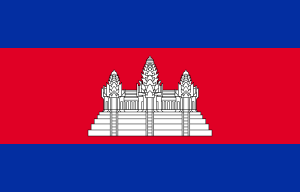Language/Central-khmer/Grammar/Questions
Hi Central Khmer learners! 😊
In this lesson, we will learn about asking questions in Central Khmer.
Take some time to dive into these other pages after completing this lesson: 0 to A1 Course & Possessive Pronouns.
Question Words[edit | edit source]
In Central Khmer, just like in English, there are some specific question words used to ask questions. Here are some of the most common ones:
| Central Khmer | Pronunciation | English |
|---|---|---|
| តើ | "tov" | (used for yes/no questions) |
| នៅពេលណា | "nɨpʰĕal naa" | when |
| តើអ្នក | "tov aenek" | who |
| តើអ្នកចង់ | "tov aenek cɑɑɲ" | do you want |
| តើអ្នកត្រូវ | "tov aenek trɑv" | should you |
| អ្វី | "ɑvɨy" | what |
| តើអ្នកស្គាល់ | "tov aenek skɑl" | do you know |
| តើ | "tov" | are/is |
| មកពីណា | "mɔk pi naa" | where from |
Word Order[edit | edit source]
The word order in Central Khmer is different from English when asking questions. In English, we usually put the question word at the beginning of the sentence, followed by the subject and verb. In Central Khmer, the subject comes first, then the verb, and finally the question word.
Here is an example:
- English: What is your name?
- Central Khmer: ឈ្មោះអ្នកជាអីខ្ញុំ? (Chʊmɨaa neak jɔɔm chi mɨy?)
As you can see, the sentence structure in Central Khmer is subject-verb-question word. Another example:
- English: When are you going to the market?
- Central Khmer: អ្នកនឹងទៅកន្លែងទីផ្សារនៅពេលណា? (Anek nɨŋ tɨw kɑna lɑeŋ tiʔ psa nɨpʰĕal naa?)
Question Particles[edit | edit source]
In addition to question words, Central Khmer also has some question particles that can be added to a statement to turn it into a question. These include:
- ម៉ែនជាទី (maaeŋ cĕa ti): tag question "isn't it?"
- ទេព្រេង (trɑ̆ɑp riəŋ): question marker "right?"
Here is an example:
- Statement: ខ្ញុំចង់ទៅហាងបាន (Khɲɔɔm cɑɑɲ tɨw haeng ban): I want to go to the store.
- Question: ខ្ញុំចង់ទៅហាងបានម៉ែនជាទី? (Khɲɔɔm cɑɑɲ tɨw haeng ban maaeŋ cĕa ti?): I want to go to the store, isn't it?
Example Dialogue[edit | edit source]
Here is an example dialogue to show you how to use some of the question words and particles in context:
- Person 1: អ្នកមិនចង់ទៅទីណា? (Anek min cɑɑɲ tɨw ti naa?) - Don't you want to go somewhere?
- Person 2: ខ្ញុំចង់ទៅកម្មវិធីបុគ្គលិកទីនេះ។ (Khɲɔɔm cɑɑɲ tɨw kɑm mɨtʰvitʰ bɔkklik ti nee.) - I want to go to this event.
- Person 1: តើអ្នកធ្លាប់មកពីណា? (Tov aenek tlaap maak pi naa?) - Where did you just come from?
- Person 2: ខ្ញុំធ្វើមកពីផ្ទះ។ (Khɲɔɔm tvɨj maak pi tʰɑh.) - I came from home.
Final Thoughts[edit | edit source]
Asking questions is an important skill to have when learning a new language. By learning the question words, word order, and question particles in Central Khmer, you will be able to communicate more effectively and have more meaningful conversations with native speakers.
To improve your Central Khmer Grammar, you can also use the Polyglot Club website. Find native speakers and ask them any questions!
Sources[edit | edit source]
Other Lessons[edit | edit source]
- How to Use Have
- How to Use Be
- Adjectives
- Give your Opinion
- Pronouns
- Negation
- Gender
- Plurals
- Conditional Mood

